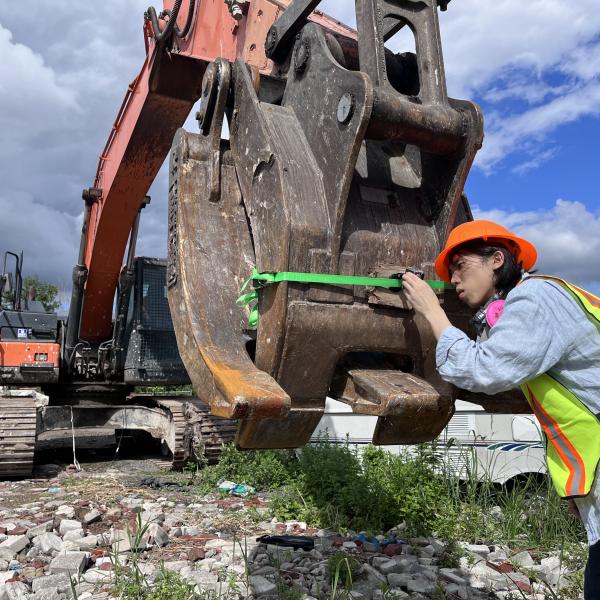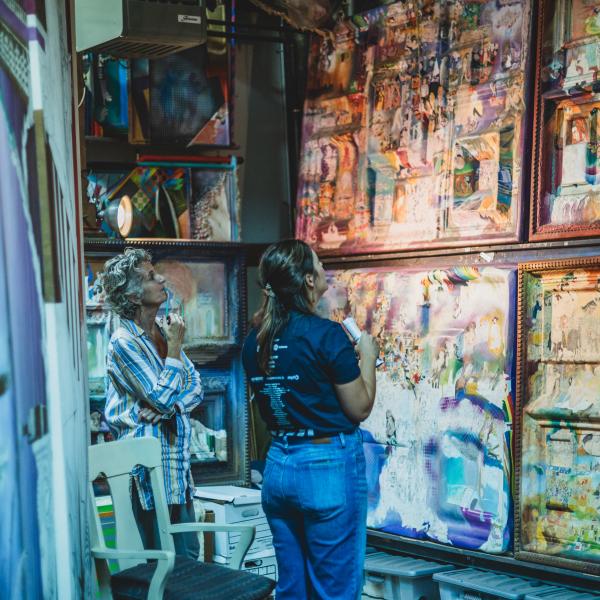Resilient Entrepreneurs

June 2023 grand opening of the Tuba City Entrepreneurship Hub. From left to right: Council Delegate Otto Tso (Diné/Navajo), Change Labs executive director Heather Fleming (Diné/Navajo), Navajo Nation President Buu Nygren (Diné/Navajo), Change Labs co-founder Jessica Stago (Diné/Navajo), Change Labs Board Chair Brett Isaac (Diné/Navajo). Photo by Jesse Wodin
In the heart of the Navajo and Hopi Nations, where the vast expanse of rugged terrain meets the sky, Change Labs, a Native-led nonprofit, is reshaping the landscape of entrepreneurship on tribal land in Shiprock, New Mexico, and Tuba City, Arizona—providing free work spaces that support the advancement of artists, vendors, and entrepreneurs within Native communities. Heather Fleming (Diné/Navajo), co-founder and executive director of Change Labs, traces the organization’s genesis back to her own quest for connection between her academic pursuits and the needs of her Native community. “When I went to college, like all good Navajo kids, the tribe gives us money and tells us, ‘Go educate yourself and come back and do good things,’ and I wanted to do that,” Fleming said. “My cousins had done that. But when I went to college, I wasn't sure how to [bring back] the skills that I learned there.” With a bachelor’s degree in product design from Stanford University, Fleming went on to pursue a ten-year career in international development.
“That whole time I was looking for a way to bring the skills that I had, which probably can best be described at that point as creative problem-solving. I was running a design firm in San Francisco called Catapult Design and we were working with social entrepreneurs around the world to design new systems, new products that were benefiting base-of-the-pyramid populations,” said Fleming. “I had a lot of experience at that point working with startups, and the startups I was working with were working on a lot of the same challenges that we have on the reservation, like access to clean water and rural electrification. I was really interested in the cross-pollination of those ideas.”
In 2013, Fleming joined forces with fellow Change Labs co-founders Jessica Stago (Diné/Navajo), and Natasha Hale (Diné/Navajo), and launched the inaugural Change Labs event, which celebrated Native entrepreneurship. Alvin Warren of the W.W. Kellogg Foundation attended the event and told Fleming, “I'm going to give you guys a half a million dollars, and you do more of these events.” Over the next three years, Fleming, Hale, and Stago went on to host three more events. Fleming said, “Between the three of us, we were creating these constellations of activities, business incubation, and new digital tools for entrepreneurs that were coupled to these events that were celebrating technology and entrepreneurship and innovation in various locations around the reservation, and each event got bigger and bigger.”
In 2017, one of the working group events in Tuba City brought to light that there was no hub on the reservation to get all of the working tools that a creative or entrepreneur might need. Fleming said, “Everything is paper-based. People have to drive for hours to get any type of information. There's no Nolo [publisher of do-it-yourself books] article for how to start a business on the reservation. The whole process was kind of cloaked in secrecy and money and myths, so I really gravitated toward this idea where you could come in [to an entrepreneurship hub] and be greeted with a friendly person who wanted to help you.” Fleming, Stago, and Hale decided that it was time to stop doing Change Labs events in their spare time, and, in 2019, Change Labs was established as the Navajo Nation's first coworking and business incubation center. The organization’s Kinship Loaning programs require participants to be Navajo or Hopi, to fill out an application that shows a business’ profit and loss, and to have community member recommendations. Fleming said, “We don’t pull credit. We don’t ask for collateral. Collateral doesn’t really exist in Native communities.”

Evening photo of the Tuba City Entrepreneurship Hub from the south side. Photo by Racquel Black (Diné/Navajo)
In 2023, the first Change Labs entrepreneurship hub (also known as E-ship hub) was created in Tuba City and serves as a “place where entrepreneurs are welcomed and celebrated, and where you'll meet other entrepreneurs, where you can start tearing down some of the cultural barriers, the social barriers, the information-access barriers, maybe even financial barriers,” Fleming said. The 1,400-square-foot space provides a free work area that includes access to laptops, wi-fi, a print and scan center, business coaching sessions, and a meeting room. With support from the Arts Endowment for architectural designs, the next entrepreneurship hub will be built by 2025 in Shiprock, New Mexico.
Fleming explained the symbiotic relationship between design and entrepreneurship: “To me, design is all about creative problem-solving. What is entrepreneurship other than problem-solving?” One example of creative problem-solving is from Shiprock community roundtable discussions, where the importance of food came up as a way to bring people together. The design team listened to the community feedback, and a kitchen is set to be at the center of the hub. Fleming said, “I don't know if it's the golden rule, but you don't design for yourself. Who is your customer? What are their needs? How do you root your solutions in those needs?”
Working with MASS Design Group, led by Joseph Kunkel (Northern Cheyenne Nation) and Nathaniel Corum, Fleming noted, “When they designed our Tuba City E-ship hub, they were very mindful of how the space reflected the brand that we were trying to build. Having them on board for the second E-ship hub, they can take the physical space aesthetic that they established for us in Tuba City and translate that to Shiprock. It's a very different challenge, because in Tuba City we built a building from the ground up. Whereas in Shiprock, we are leasing a space within the Navajo Nation shopping centers, and it's a bigger space than our one in Tuba City.”
Change Labs is fine-tuning their search for someone in the community to help lead the charge on carving out artistic spaces at the entrepreneurship hubs. Fleming said, “I worked with Stanford University to bring two of our Navajo artists out to teach a class last fall, and they got to go into the product realization lab there and visit the d.school [a program where people use design to develop their own creative potential and make positive change in the world]. I wasn't surprised. They came back and they were like, ‘This is what we need on the reservation,’ and I said, ‘I know! One of you guys should do it or find somebody who could do that. Let's put a business plan together.”’

Heather Fleming (center) with community members and Change Labs and MASS Design Group team members at a community engagement meeting to envision the future Change Labs Entrepreneurship Hub at Shiprock, New Mexico (Navajo Nation). Photo courtesy of MASS Design Group
Prior to the COVID-19 pandemic, Change Labs had a goal of building six entrepreneurship hubs around the reservation. “We didn't have anything online and now everything is online and everybody expects to join via Zoom. They prefer that versus coming in, despite the fact that the anecdotal data that we have suggests that the in-person peer learning is one of the most valuable things we have to offer. We're trying to reconcile that tension and also reconcile the fact that it is incredibly hard to build physical infrastructure within tribal lands,” said Fleming. “Knowing all of those hurdles and knowing that the world has changed, one question I have for the board is about whether or not six entrepreneurship hubs is still correct, or if we need to think about how the world of work is going to be in the future. Maybe we don't need to rely as much on brick and mortar as we thought before, or maybe it is the opposite.”
In terms of measuring success for Change Labs, Fleming explained, “If we look at what Indigenous entrepreneurship looked like before White people came, it didn't look like Silicon Valley at all and it was rooted in reciprocity. What that translates into is how we measure success of business activity. Of course, we talk about the importance of making money, but our goal isn't to get people set up to make the most money possible, because we know that's not our traditional value. We do measure the things that are directly tied to our theory of change, and that is increasing human capital, increasing social capital, access to physical and financial capital, and increasing economic agency.”
Over the past year, Change Labs has been developing a framework to define what economic well-being within an Indigenous community looks like. During their research, they discovered that a group in Hawaiʻi has developed a framework for community health, but no other tribes have done it for economics. “It's going to take a few years of data collection to start seeing patterns,” said Fleming.
As data may fluctuate and the world evolves, what remains constant is the pivotal role that art, design, and entrepreneurship play in empowering Native communities and fostering economic resilience. Native artists are a critical piece in Native history, and if you travel to Navajo Nation and browse at a flea market or roadside vendor, you’ll find many artists selling handmade jewelry, carvings, pottery, weavings, and rugs. Fleming said, “Many of our artisans don't necessarily see themselves as entrepreneurs. We [Change Labs] like to celebrate them as the resilient entrepreneurs who have basically kept our culture and our communities alive for decades and try to instill pride in that. I think there's a lot to be done in building pride and addressing lateral violence amongst our own people. I see entrepreneurship as one of many ways that we can do that.”








